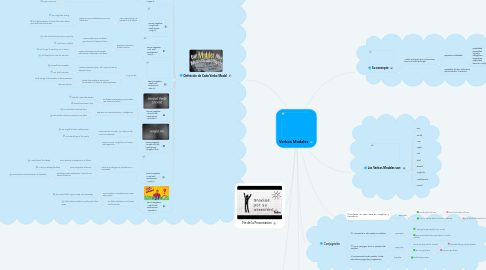
1. Definición de Cada Verbo Modal
1.1. Forma negativa: "Cannot" Contracción: "Can´t".
1.1.1. Solo En oraciones de presente o en futuro
1.1.1.1. Indican habilidad, capacidad y posibilidad.
1.1.1.1.1. En forma interrogativa, usada para permiso o posibilidades.
1.1.1.1.2. I can't speak English
1.1.1.1.3. I can go to your party.
1.2. Forma negativa: "Could not" Contracción: "Couldn't".
1.2.1. Posibilidad y habilidad en el pasado y en el futuro
1.2.1.1. He could jump the wall
1.2.1.2. Danny could dance for hours when he was a teenager
1.2.2. Formas interrogativas de manera más formal.
1.2.2.1. Culd you let me your pencil, please?
1.2.2.2. Could I be wrong?
1.3. Forma negativa: "May not" Contracción: "Mayn't".
1.3.1. Permisos o instrucciones.
1.3.1.1. Para indicar posibilidades en el futuro.
1.3.1.1.1. I would bring an umbrella, it may rain later.
1.3.1.1.2. You may start the exam now
1.3.1.2. En frases interrogativas, es más educado que “can” o “could”.
1.3.1.2.1. May I have a piece of cake?
1.3.1.2.2. May I come in?
1.4. Forma negativa: "Might not" Contracción: "Mayn't".
1.4.1. Para oraciones en el presente o el futuro.
1.4.1.1. Expresa una probabilidad pero con debilidad.
1.4.1.1.1. You might be wrong.
1.4.1.1.2. It might be better to finish this now, rather than wait until tomorrow.
1.5. Forma negativa: "Will not" Contracción: "Won´t".
1.5.1. Expresa voluntad o determinación.
1.5.1.1. Verbo auxiliar que se utiliza para formar el tiempo futuro
1.5.1.1.1. I will do that for you if you want to
1.5.1.1.2. I will have a coffee
1.5.1.2. Frases interrogativas para pedir información, opciones o un favor.
1.5.1.2.1. Will he go to Paris by car or train?
1.5.1.2.2. Will they find a cure for cancer?
1.6. Forma negativa: "Shall not" Contracción: "Shan't".
1.6.1. Muy formal
1.6.1.1. Mismas ocasiones que "will" para formar el tiempo futuro.
1.6.1.1.1. We will learn English.
1.6.1.1.2. You shall not pass.
1.6.1.2. frases interrogativas para pedir información, un favor o sobre opciones.
1.6.1.2.1. Shall we go to the beach or the mountain?
1.6.1.2.2. Shall we dance?
1.7. Forma negativa: "Should not" Contracción: "Shouldn't".
1.7.1. En frases interrogativas; para pedir una recomendación.
1.7.1.1. Should I wear this dress?
1.7.1.2. Should we leave a tip?
1.7.2. Expresa una recomendación u obligación.
1.7.2.1. You shouldn’t work so hard.
1.7.2.2. You should call your parents more often
1.8. Forma negativa: "Ought not (to)" Contracción: "Oughtn't (to)".
1.8.1. Sinónimo de “should”. se utiliza en las mismas ocasiones.
1.8.1.1. We ought to have a salary raise.
1.8.1.2. You should go to the party.
1.8.2. Nunca se usa “ought to” en frases interrogativas.
1.9. Forma negativa: "Must not" Contracción: "Mustn't".
1.9.1. Indica una obligación, prohibición o necesidad
1.9.1.1. Para referirse al presente o al futuro.
1.9.1.1.1. I must check the labels
1.9.1.2. Para preguntas retóricas.
1.9.1.2.1. Must you always be late?
1.9.1.3. También puede emplearse “have to” en frases afirmativa
1.9.1.3.1. You have to read this book, it’s fantastic.
1.10. Forma negativa: "Would not" Contracción: "Wouldn't".
1.10.1. Para mostrar una preferencia o que algo gusta.
1.10.1.1. She would like to go to New York someday.
1.10.2. Se utiliza también en las frases condicionales.
1.10.2.1. If he finds his wallet, he will pay for the pizza
2. Fin de la Presentacion
3. modal verbs
4. ELABORADO POR: GERMAN RODRIGEZ ( INGLEZ II )
5. No llevan “to” salvo “have to”, “ought to” y “be able to”
5.1. Ejemplos
5.1.1. You should call him.
5.1.1.1. You should (to) call him.
5.1.2. He should be able to find the address.
5.1.2.1. .He should be able find the address.
6. Su concepto
6.1. Verbos auxiliares que no funcionan como un verbo principal
6.1.1. Expresan modalidad
6.1.1.1. -Posibilidad -Necesidad -Consejo -Obligación -Sugerencia -Capacidad -Permiso u Obligación
6.1.2. Necesitan de otro verbo para darle sentido a la oración.
7. Los Verbos Modales son:
7.1. Can
7.2. Could
7.3. May
7.4. Might
7.5. Will
7.6. Shall
7.7. Should
7.8. Ought to
7.9. Must/have to
7.10. Would
8. Conjugación
8.1. Acompañan a otro verbo en Infinitivo
8.1.1. Ejemplos
8.1.1.1. I can go to your party. (Can y Go)
8.1.1.2. You must follow the instructions. (Must y Follow)
8.2. No se conjugan, en la 3º persona del singular.
8.2.1. Ejemplos
8.2.1.1. She should go to the doctor.
8.2.1.1.1. She shoulds go to the doctor.
8.2.1.2. He can go there.
8.2.1.2.1. He cans go there.
8.3. No precisa el verbo auxiliar "to do" para hacer preguntas y negaciones.
8.3.1. Ejemplo
8.3.1.1. Shall we go now?
